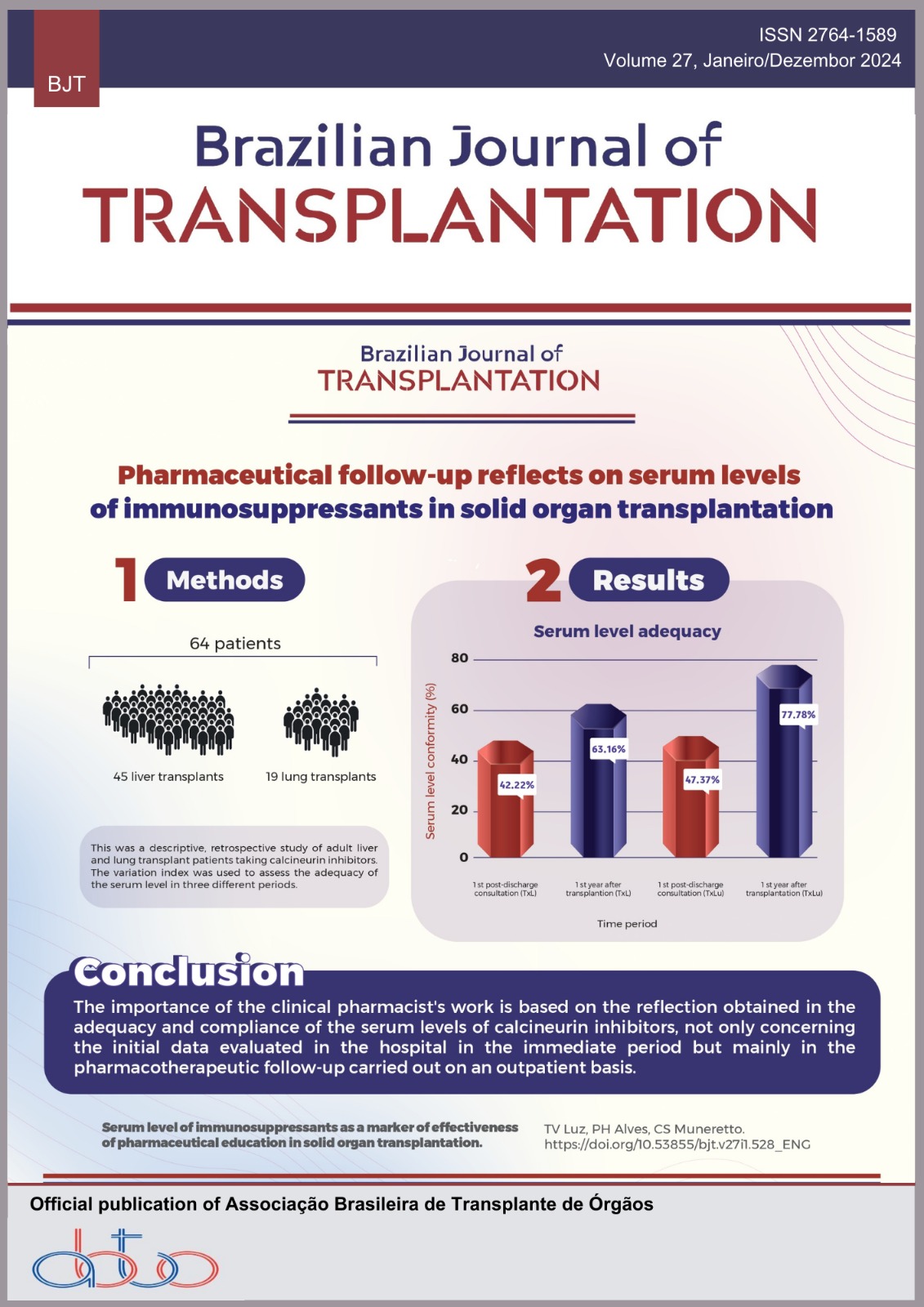Transplante Renal em Idosos: Experiência de Cinco Anos
Palavras-chave:
Transplante de Rim, Idoso, Função Retardada do Enxerto, Sobrevivência do Enxerto, Sobrevivência do PacienteResumo
Objetivos: A prevalência de doença renal em estágio terminal está aumentando entre os adultos mais velhos em todo o mundo. Apesar de o transplante renal ser considerado a melhor terapia de substituição renal, ele apresenta desafios únicos em pacientes idosos. Este estudo pretende descrever o transplante renal com doador falecido em nosso centro, analisar os resultados, nomeadamente, função tardia do enxerto (FTE), rejeição aguda, infecções bacterianas e perda do aloenxerto censurada para a morte em pacientes com 65 anos ou mais, e comparar a sobrevida do enxerto e do paciente com receptores com menos de 65 anos. Métodos: Foi realizado um estudo de coorte retrospectivo em um único centro sobre transplante renal de doador falecido entre 2016 e 2020. Foram coletados dados sobre as características do doador, do receptor e do transplante, e os resultados após o transplante foram analisados. A regressão univariada de Cox foi usada para comparar a sobrevida do paciente e do aloenxerto censurada para a morte entre pacientes mais velhos e mais jovens. Resultados: Dos 294 transplantes de doadores falecidos realizados, 48 foram alocados para receptores com 65 anos ou mais. Esses pacientes tiveram uma prevalência significativamente maior de doadores com critérios estendidos (DCE) em comparação com receptores mais jovens (p < 0,001). A idade média dos receptores no grupo de idosos foi de 68 ± 2 anos, com um acompanhamento mediano de 29 meses (intervalo interquartil [IQR] 18-49). Durante o primeiro ano, cinco (10,4%) pacientes foram diagnosticados com rejeição aguda comprovada por biópsia e 24 (50%) com infecções bacterianas. A FTE foi observada em 27 (56,3%) pacientes e foi associada a uma proporção maior de doadores de alto risco (doadores com DCE e morte circulatória não controlada com perfusão regional normotérmica) (p = 0,034), tempos isquêmicos frios mais longos (p = 0,031) e maior duração de hospitalização (p < 0,001). A sobrevida do aloenxerto censurado para a morte em 1, 3 e 5 anos foi de 89,1, 89,1 e 84,6%, respectivamente, o que não foi estatisticamente diferente do grupo de receptores mais jovens (p = 0,56). Durante o acompanhamento, cinco pacientes morreram, três (60%) dos quais tinham um aloenxerto funcional. A sobrevida dos pacientes em 1, 3 e 5 anos foi de 100, 97,6 e 79,2%, respectivamente, mais uma vez sem diferenças notáveis em comparação com os receptores mais jovens (p = 0,12). Conclusão: Embora uma abordagem individualizada e uma cuidadosa avaliação pré-transplante sejam fundamentais para o sucesso do transplante renal na população idosa, nossa sobrevida do aloenxerto e do paciente censurado para a morte em 1, 3 e 5 anos em pacientes idosos foi semelhante à dos receptores mais jovens.
Downloads
Referências
Lemoine M, Beauport DT, Lobbedez T, Choukroun G, Ligny BH, Hazzan M, et al. Risk factors for early graft failure and death after kidney transplantation in recipients older than 70 years. Kidney Int Rep 2019;4(5):656-66. https://doi.org/10.1016/j.ekir.2019.01.014
Singh P, Ng YH, Unruh M. Kidney Transplantation among the elderly: challenges and opportunities to improve outcomes. Adv Chronic Kidney Dis 2016;23(1):44-50. https://doi.org/10.1053/j.ackd.2015.11.002
Rebollo P, Ortega F, Baltar JM, Badia X, Alvarez-Ude F, Diaz-Corte C, et al. Health related quality of life (HRQOL) of kidney transplanted patients: variables that influence it. Clin Transplant 2000;14(3):199-207. https://doi.org/10.1034/j.1399-0012.2000.140304.x
Rao PS, Merion RM, Ashby VB, Port FK, Wolfe RA, Kayler LK. Renal transplantation in elderly patients older than 70 years of age: results from the Scientific Registry of Transplant Recipients. Transplantation 2007;83(8):1069-74. https://doi.org/10.1097/01.tp.0000259621.56861.3
Jassal SV, Krahn MD, Naglie G, Zaltzman JS, Roscoe JM, Cole EH, et al. Kidney transplantation in the elderly: a decision analysis. J Am Soc Nephrol 2003;14(1):187-96. https://doi.org/10.1097/01.ASN.0000042166.70351.57
Huang E, Poommipanit N, Sampaio MS, Kuo HT, Reddy P, Gritsch HA, et al. Intermediate-term outcomes associated with kidney transplantation in recipients 80 years and older: an analysis of the OPTN/UNOS database. Transplantation 2010;90(9):974-9. https://doi.org/10.1097/TP.0b013e3181f5c3bf
Wolfe RA, Ashby VB, Milford EL, Ojo AO, Ettenger RE, Agodoa LY, et al. Comparison of mortality in all patients on dialysis, patients on dialysis awaiting transplantation, and recipients of a first cadaveric transplant. N Engl J Med 1999;341(23):1725-30. https://doi.org/10.1056/NEJM199912023412303
McAdams-DeMarco MA, James N, Salter ML, Walston J, Segev DL. Trends in kidney transplant outcomes in older adults. J Am Geriatr Soc 2014;62(12):2235-42. https://doi.org/10.1111/jgs.13130
Hernandez D, Alonso-Titos J, Armas-Padron AM, Ruiz-Esteban P, Cabello M, Lopez V, et al. Mortality in elderly waitinglist patients versus age-matched kidney transplant recipients: where is the risk? Kidney Blood Press Res 2018;43(1):256-75. https://doi.org/10.1159/000487684
Schold J, Srinivas TR, Sehgal AR, Meier-Kriesche HU. Half of kidney transplant candidates who are older than 60 years now placed on the waiting list will die before receiving a deceased-donor transplant. Clin J Am Soc Nephrol 2009;4(7):1239-45. https://doi.org/10.2215/CJN.01280209
Merion RM, Ashby VB, Wolfe RA, Distant DA, Hulbert-Shearon TE, Metzger RA, et al. Deceased-donor characteristics and the survival benefit of kidney transplantation. JAMA 2005;294(21):2726-33. https://doi.org/10.1001/jama.294.21.2726
Erlandsson H, Qureshi AR, Scholz T, Lundgren T, Bruchfeld A, Stenvinkel P, et al. Observational study of risk factors associated with clinical outcome among elderly kidney transplant recipients in Sweden – A decade of follow-up. Transpl Int 2021;34(11):2363-70. https://doi.org/10.1111/tri.14004
Shaffi K, Uhlig K, Perrone RD, Ruthazer R, Rule A, Lieske JC, et al. Performance of creatinine-based GFR estimating equations in solid-organ transplant recipients. Am J Kidney Dis 2014;63(6):1007-18. https://doi.org/10.1053/j.ajkd.2014.01.436
Galvão A, Filipe R, Carvalho MJ, Leal R, Neves M, Amoedo M, et al. Portuguese Registry of Kidney Replacement Therapy 2022: Sociedade Portuguesa de Nefrologia; 2023 [cited 2024 Jan 14] Available from: https://www.spnefro.pt/assets/relatorios/tratamento_doenca_terminal/er2023_registo.pdf
Cabrera J, Fernandez-Ruiz M, Trujillo H, Gonzalez E, Molina M, Polanco N, et al. Kidney transplantation in the extremely elderly from extremely aged deceased donors: a kidney for each age. Nephrol Dial Transplant 2020;35(4):687-96. https://doi.org/10.1093/ndt/gfz293
Hellemans R, Kramer A, De Meester J, Collart F, Kuypers D, Jadoul M, et al. Does kidney transplantation with a standard or expanded criteria donor improve patient survival? Results from a Belgian cohort. Nephrol Dial Transplant 2021;36(5):918-26. https://doi.org/10.1093/ndt/gfz293
Peters-Sengers H, Berger SP, Heemskerk MB, Al Arashi D, Homan van der Heide JJ, Hemke AC, et al. Stretching the limits of renal transplantation in elderly recipients of grafts from elderly deceased donors. J Am Soc Nephrol 2017;28(2):621-31. https://doi.org/10.1681/ASN.2015080879
Segall L, Nistor I, Pascual J, Mucsi I, Guirado L, Higgins R, et al. Criteria for and appropriateness of renal transplantation in elderly patients with end-stage renal disease. A literature review and position statement on behalf of the European Renal Association-European Dialysis and Transplant Association Descartes Working Group and European Renal Best Practice. Transplantation 2016;100(10):e55-65. https://doi.org/10.1097/TP.0000000000001367
Zompolas I, Peters R, Liefeldt L, Lehner LJ, Budde K, Ralla B, et al. Outcomes of deceased donor kidney transplantation in the Eurotransplant Senior Program with a focus on recipients ± 75 Years. J Clin Med 2021;10(23). https://doi.org/10.3390/jcm10235633
Faravardeh A, Eickhoff M, Jackson S, Spong R, Kukla A, Issa N, et al. Predictors of graft failure and death in elderly kidney transplant recipients. Transplantation 2013;96(12):1089-96. https://doi.org/10.1097/TP.0b013e3182a688e5
Lim WH, McDonald SP, Russ GR, Chapman JR, Ma MK, Pleass H, et al. Association between delayed graft function and graft loss in donation after cardiac death kidney transplants – A paired kidney registry analysis. Transplantation 2017;101(6):1139-43. https://doi.org/10.1097/TP.0000000000001323
Han F, Lin MZ, Zhou HL, Li H, Sun QP, Huang ZY, et al. Delayed graft function is correlated with graft loss in recipients of expanded-criteria rather than standard-criteria donor kidneys: a retrospective, multicenter, observation cohort study. Chin Med J (Engl) 2020;133(5):561-70. https://doi.org/10.1097/CM9.0000000000000666
Helfer MS, Pompeo JC, Costa ORS, Vicari AR, Ribeiro AR, Manfro RC. Long-term effects of delayed graft function duration on function and survival of deceased donor kidney transplants. J Bras Nefrol 2019;41(2):231-41. https://doi.org/10.1590/2175-8239-JBN-2018-0065
Lim WH, Johnson DW, Teixeira-Pinto A, Wong G. Association between duration of delayed graft function, acute rejection, and allograft outcome after deceased donor kidney transplantation. Transplantation 2019;103(2):412-9. https://doi.org/10.1097/TP.0000000000002275
Montero N, Perez-Saez MJ, Pascual J, Group DW, Board DE-E, Abramowicz D, et al. Immunosuppression in the elderly renal allograft recipient: a systematic review. Transplant Rev (Orlando) 2016;30(3):144-53. https://doi.org/10.1016/j.trre.2016.05.001
Dreyer GJ, de Fijter JW. Transplanting the elderly: mandatory age- and minimal histocompatibility matching. Front Immunol 2020;11:359. https://doi.org/10.3389/fimmu.2020.00359
Wyld MLR, De La Mata NL, Masson P, O’Lone E, Kelly PJ, Webster AC. Cardiac mortality in kidney transplant patients: a population-based cohort study 1988-2013 in Australia and New Zealand. Transplantation 2021;105(2):413-22. https://doi.org/10.1097/TP.0000000000003224
Grosso G, Corona D, Mistretta A, Zerbo D, Sinagra N, Giaquinta A, et al. Predictive value of the Charlson comorbidity index in kidney transplantation. Transplant Proc 2012;44(7):1859-63. https://doi.org/10.1016/j.transproceed.2012.06.042
Lai X, Chen G, Qiu J, Wang C, Chen L. Recipient-related risk factors for graft failure and death in elderly kidney transplant recipients. PLoS One 2014;9(11):e112938. https://doi.org/10.1371/journal.pone.0112938
So S, Au EHK, Lim WH, Lee VWS, Wong G. Factors influencing long-term patient and allograft outcomes in elderly kidney transplant recipients. Kidney Int Rep 2021;6(3):727-36. https://doi.org/10.1016/j.ekir.2020.11.035
Bahde R, Vowinkel T, Unser J, Anthoni C, Holzen JP, Suwelack B, et al. Prognostic factors for kidney allograft survival in the Eurotransplant Senior Program. Ann Transplant 2014;19:201-9. https://doi.org/10.12659/aot.890125
Downloads
Publicado
Como Citar
Edição
Seção
Licença
Copyright (c) 2024 Núria Paulo, Vítor Fernandes, Ana Cerqueira, Manuela Bustorff, Ana Pinho, Susana Sampaio, Manuel Pestana

Este trabalho está licenciado sob uma licença Creative Commons Attribution 4.0 International License.

















